CBC
Fri, 14 June 2024
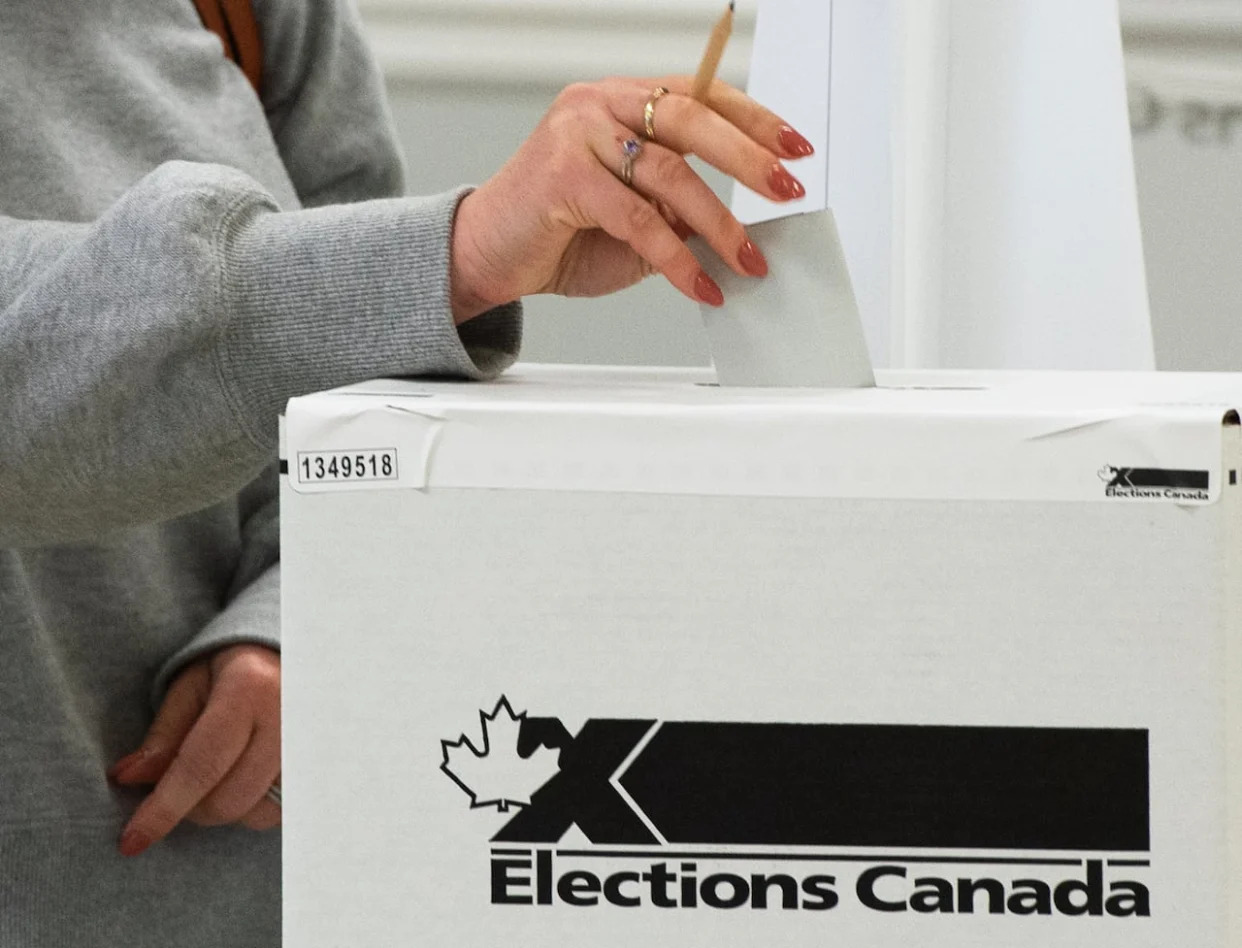
Voters in the riding of Toronto-St. Paul's head to the polls on June 24. (Ryan Remiorz/The Canadian Press - image credit)
When voters in Toronto-St. Paul's go to the polls later this month, they might be wishing the ballot had a search function.
A record 84 people have put their names forward as candidates for the June 24 byelection, making it the longest ballot ever in a federal election.
Dozens of independent candidates have entered the race as part of an organized protest against Canada's first-past-the-post voting system.
"We need to highlight the fact that our voting system is a joke and it's producing results that are completely inaccurate and distorted," said Glen MacDonald, a candidate in Toronto-St. Paul's and a volunteer with the group Longest Ballot Committee.
MacDonald pointed to the last two elections, which the Liberals won despite losing the popular vote.
The Longest Ballot Committee has encouraged candidates to put their names forward in protest in two previous byelections — in the Ontario riding of Mississauga-Lakeshore in 2022 and last year in Winnipeg South Centre, which previously held the record for most candidates. For Toronto-St. Paul's, the group has roughly doubled the number of candidates on the ballot; the previous two campaigns had 40 and 48 candidates respectively.
Julie St-Amand, who has put her name on the ballot for all three of those byelections, said advocacy campaigns in the past haven't been effective and she hopes the high number of candidates is drawing attention to the electoral reform debate.
"By just getting more people aware and talking about it, we're hoping it just spreads like wildfire," she said.
Elections Canada has had to make a number of temporary changes to the Elections Act in order to accommodate the oversized ballots. (The law allows the head of Elections Canada to make short-term changes in the case of "an emergency, an unusual or unforeseen circumstance.")
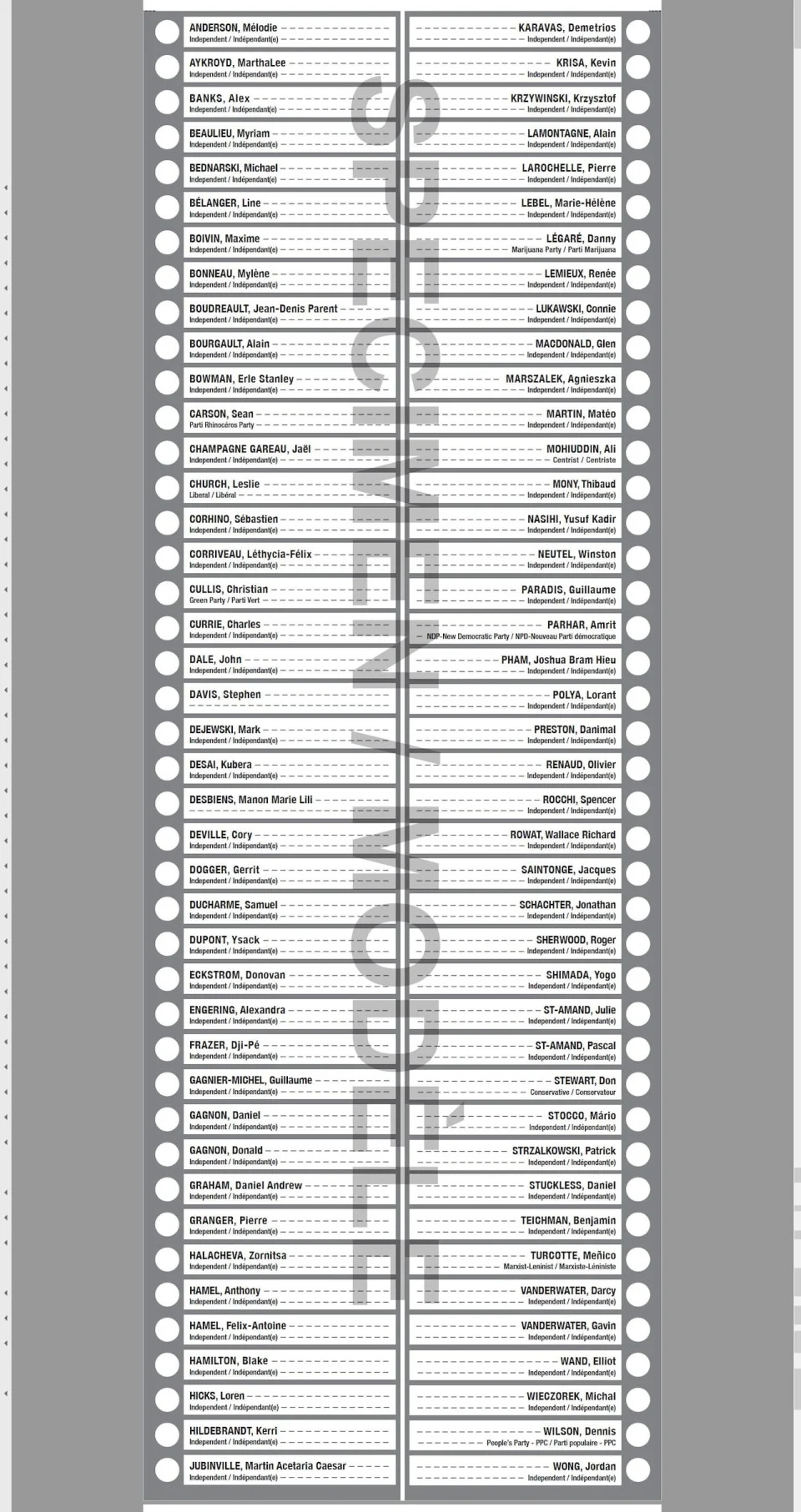
The ballot for the Tronto-St.Paul's byelection — the longest in federal election history — will be almost a metre long, according to Elections Canada.
The ballot for the Toronto-St.Paul's byelection — the longest in federal election history — will be almost a metre long says Elections Canada. (Elections Canada)
The ballot will have two columns of candidates listed side-by-side, instead of the traditional single column. In addition, the circles where voters mark their preference will be listed on the right and left margins of the ballot. (The Elections Act states the circles should always be listed to the right of a candidate's name.)
Elections Canada says the ballot is 30 centimetres wide and 90 centimetres long.
A typical ballot box can contain 1,000 ballots. Elections Canada expects only 100 will fit in each ballot box on election night in Toronto St. Paul's.
Trudeau promised electoral reform in 2015
Under Canada's current voting system, a candidate can win a riding by simply winning the most votes, even if they fail to win 50 per cent support.
Both St-Amand and MacDonald said they would prefer some kind of proportional electoral system where the seats in the House of Commons reflect a party's national vote share.
During his first campaign as Liberal leader, Prime Minister Justin Trudeau promised to make the 2015 election the last under the first-past-the-post voting system.
But once in government, Trudeau and the Liberals slowly backed away from that promise.
MacDonald said he was "appalled" by that decision.
"It added to a level of cynicism that a lot of people have with regards to politics and with regards to voting. Politicians promise one thing and as soon as they get into office they decide, 'Well, we didn't really mean that,'" he said.
But MacDonald pointed out that the Liberals aren't the only party that has abandoned the idea of electoral reform.
"It's a problem that we've been suffering through on both sides of the political spectrum," he said.
The NDP has long advocated for electoral reform. But no NDP provincial government has made a change to their jurisdiction's voting system.
Even Conservative Stephen Harper flirted with the idea of electoral reform before he became prime minister.
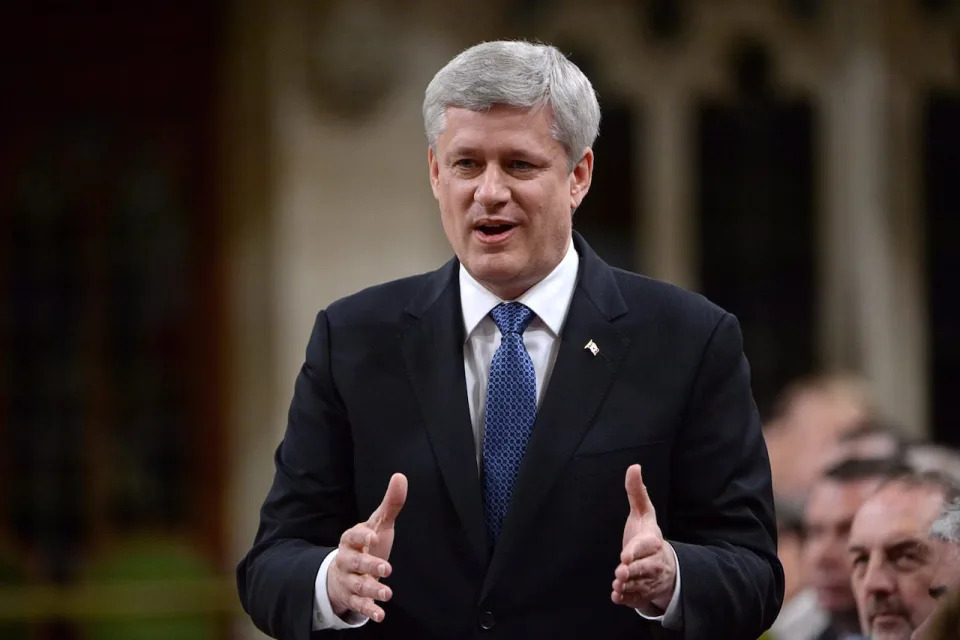
Prime Minister Stephen Harper answers a question during Question Period in the House of Commons in Ottawa on Tuesday, June 2, 2015. Prior to entering politics, former prime minister Stephen Harper suggested that right-centre parties should be pushing for electoral reform. (Sean Kilpatrick/The Canadian Press)
In a 13-page paper he co-authored in 1997, Harper decried the split in the conservative vote between the Progressive Conservatives and Reform Party that he blamed for keeping the Liberals in government at the time.
"The two parties could begin by agreeing to advocate electoral reform through the run-off, preferential ballot, or mixed-member-proportional system, which would be in the interest of both parties," Harper and co-author Tom Flanagan wrote.
But Harper didn't push for a new voting system when he took the helm of the modern Conservative Party — which amalgamated the two parties he previously suggested should consider electoral reform — and eventually formed government.
"Once you win under first-past-the-post, why would you get rid of it and risk not winning again under any other type of structure?" St-Amand said.
Her comments echo a passage from Harper and Flanagan's 1997 paper.
"It is seldom in the short-term interest of the party in power to carry out electoral reform; by definition, the system worked admirably for those now in power and changing the system might benefit the opponents next time," the two wrote.
MacDonald said he hopes the massive ballot in Toronto St-Paul's draws attention to his concerns about the current voting system. He said he would be willing to put his name down on a ballot again.
"If we do decide to do another one of these longest ballots, I would certainly put my name forward and I would support any initiative that raises the issue of electoral reform," he said.
Advanced voting opens in Toronto-St. Paul's federal byelection
CBC
Fri, 14 June 2024
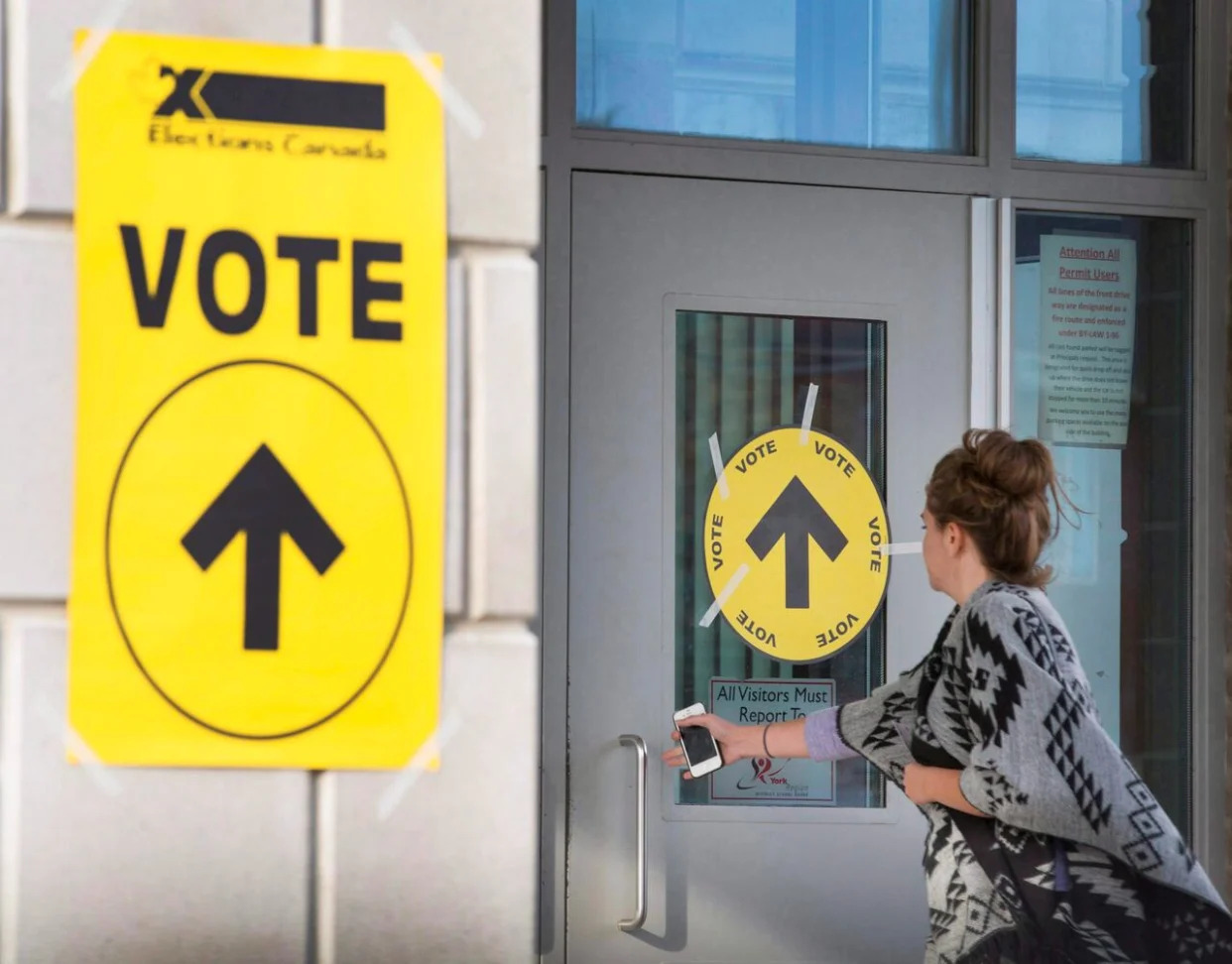
Advanced voting opens Friday in the Toronto-St. Paul's federal byelection. (Peter Power/The Canadian Press - image credit)
Advanced voting has opened for a federal byelection in the Toronto-St. Paul's riding, a Liberal stronghold that could be up for grabs as the party struggles in the polls.
The Liberals have held the seat since 1997, represented by former cabinet minister Carolyn Bennet, who resigned her seat in January to become Canada's ambassador to Denmark.
Bennett won over half the vote in the 2021 federal election, but the polls suggest things will be much tighter this time around.
Polling expert Philippe Fournier of 338Canada told CBC's Power & Politics last week that the riding is a "toss-up." He says polling data suggests the Liberals are still expected to win, but only by a margin of four to eight points.
The Liberals have won all 25 Toronto ridings in the last three general elections.
Prime Minister Justin Trudeau and over a dozen cabinet ministers were campaigning in the riding this week on behalf of their new Liberal candidate, Leslie Church, a former political staffer.
The Conservatives have nominated financial services worker Don Stewart, the NDP candidate is non-profit director Amrit Parhar and the Green Party is represented by candidate Christian Cullis, a constituent co-ordinator for Toronto city councillor Dianne Saxe. The People's Party of Canada has nominated business consultant Dennis Wilson.
The choice doesn't end there though.
There are 84 candidates on the ballot, making it the longest in the history of federal politics, according to Elections Canada.
A debate is being held on Monday from 7 p.m. to 9 p.m. at St. Michael and All Angels Anglican Church. Candidates from the Liberal, NDP, Conservative and Green parties have been invited.
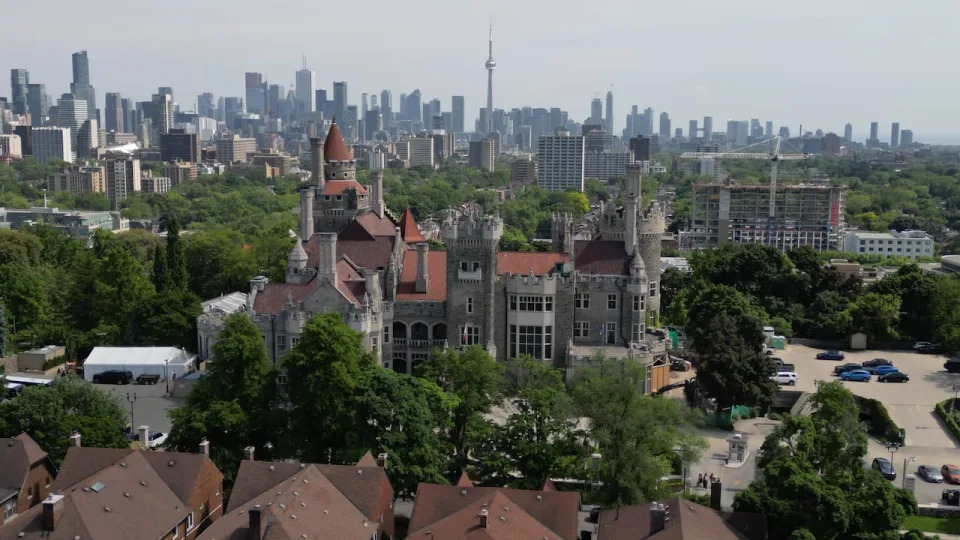
Casa Loma and a view of downtown Toronto, as seen from the air.
Casa Loma in the riding of Toronto-St. Paul's, a traditional Liberal stronghold.
(Patrick Morrell/CBC News)
The Midtown Toronto riding is home to nearly 117,000 people, according to the 2021 census. Its boundaries run roughly from Dupont Street in the south to Eglinton Avenue in the north, and Dufferin Street in the west to Mount Pleasant Road in the east.
Advance voting runs from 9 a.m. to 9 p.m. every day from June 14 to June 17. Voters can cast their ballot during those times at their assigned advanced polling station. Voters can also cast an early ballot on June 18, before 6 p.m., at the riding's Elections Canada office.
Voters can register to vote by mail if they apply before 6 p.m. on June 18.
Election day is June 24. Voting will run from 8:30 a.m. to 8:30 p.m.
The Midtown Toronto riding is home to nearly 117,000 people, according to the 2021 census. Its boundaries run roughly from Dupont Street in the south to Eglinton Avenue in the north, and Dufferin Street in the west to Mount Pleasant Road in the east.
Advance voting runs from 9 a.m. to 9 p.m. every day from June 14 to June 17. Voters can cast their ballot during those times at their assigned advanced polling station. Voters can also cast an early ballot on June 18, before 6 p.m., at the riding's Elections Canada office.
Voters can register to vote by mail if they apply before 6 p.m. on June 18.
Election day is June 24. Voting will run from 8:30 a.m. to 8:30 p.m.
No comments:
Post a Comment